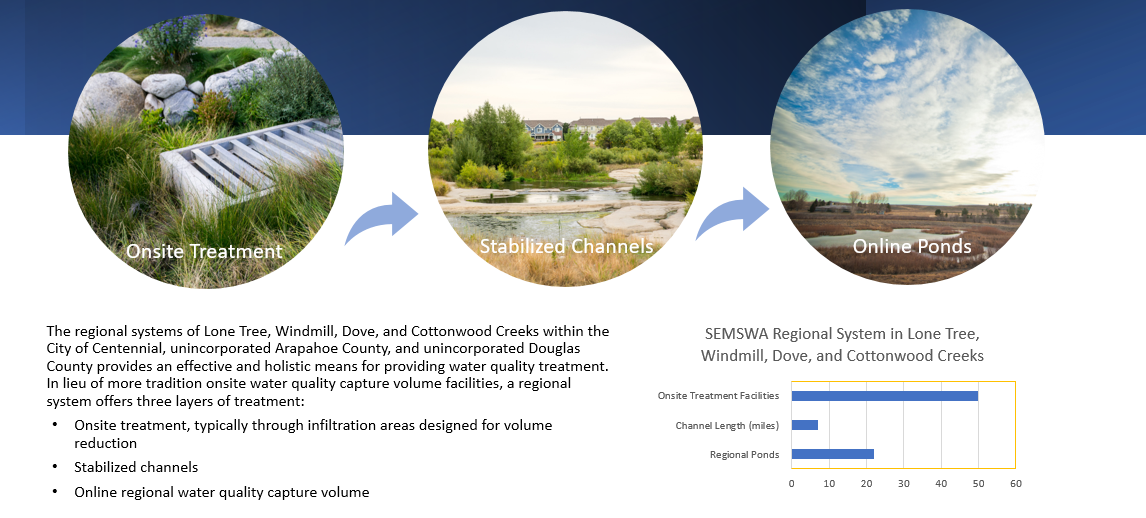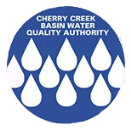Regulated Stormwater- MS4 Permittees
All municipalities with Municipal Separate Storm Sewer Systems (MS4s) permits from the Colorado Department of Public Health and Environment (CDPHE) in the watershed have adopted stormwater programs, consistent with Regulation 72, for construction projects within their jurisdictions. The requirements in Regulation 72, in some cases, go above and beyond the MS4 Permit requirements in Regulation 61 Colorado Discharge Permit System Regulations.
In 2020, the MS4 permittees conducted 13,418 inspections of 2,681 construction sites. In addition, the MS4 permittees required that construction site owners/operators install 81 new permanent control measures that are designed to reduce pollutants in stormwater before it enters Cherry Creek or its tributaries.
In 2021, the MS4 permittees conducted over 14,450 inspections (an increase of over 7% from 2020) of over 2,800 construction sites. In addition, the MS4 permittees required that construction site owners/operators install 36 new permanent control measures that are designed to reduce or eliminate pollutants in stormwater before it enters Cherry Creek or its tributaries.
Further information on each MS4’s program can be found in their annual reports in the links below.
Find Out More About MS4 Permittees' programs
- link Arapahoe County Environmental and Stormwater Management, Construction and Post-Construction
- link City of Aurora Environmental Resources
- link City of Castle Pines Stormwater
- link Town of Castle Rock Stormwater
- link Douglas County Stormwater Management
- link City of Greenwood Village Storm Water Quality
- link City of LoneTree Stormwater Management
- link SEMSWA (City of Centennial) Water Quality, Construction and Post-Construction
- link Town of Parker Stormwater
- link CDOT Water Quality
MS4 Permittee Annual Reports
Annual reports are submitted to the Division by March 10 (Phase II MS4 permittees) and April 1 (Phase I MS4 permittees)
(coming soon)
- link Arapahoe County
- link City of Aurora
- link City of Castle Pines
- link Town of Castle Rock
- link Douglas County
- link SEMSWA (City of Centennial)
- link City of Greenwood Village
- link City of Lone Tree
- link Town of Parker
.
Public Education
In addition, to regulating construction sites in the Cherry Creek reservoir basin, the MS4 permittees also have programs to educate the public, respond to and eliminate illicit discharges, and reduce or eliminate pollutants in stormwater from municipal operations.
- link One thing is Clear (Douglas County, Town of Castle Rock, Town of Parker, City of Lone Tree, Highlands Ranch Metro District, Castle Pines Metro District, Castle Pines North Metro District, Stonegate and Lincoln Park Metro Districts)
- link Arapahoe County Splash : Splash 2021 Summary (Arapahoe County, City of Cherry Hills Village, City of Centennial, Cherry Creek State Parks, City of Sheridan, Greenwood Village)
- link Town of Castle Rock Campaign Summary
- link Colorado Stormwater Council (CSC)

Above & Beyond
SEMSWA Approach to Regional Water Quality
Each of the MS4 permittees in the Cherry Creek Basin has sophisticated programs and projects, as evidenced by the Southeast Metro Stormwater Authority (also called SEMSWA) Approach to Regional Water Quality and Arapahoe County's Water Action Plan.

Arapahoe County Water Action Plan and Turf Removal Project
Through the Arapahoe County Sustainability Initiative, the County wrote a new Water Action Plan in 2021. The Water Action Plan seeks to “improve County facilities’ resource conservation through a workplace culture focused on sustainability and economics.” The short term goal is to reduce total water use by 3.4 million gallons per year or 5% below 2019 baseline within 2 years. The long-term goal is to reduce total water use by 5 million gallons per year or 8% below 2019 baseline.
One way the County will accomplish these goals is by reducing landscape water associated with County facilities. The first project is converting 3 acres of rarely-used turf grass to nonirrigated native grass at the Administration building in Littleton. The County plans to save 1.5 million gallons of irrigation water a year. In addition to removing the Kentucky Blue Grass in 2021, the County will stop fertilizing the field. Eliminating the fertilizer stops nutrient runoff from the field during storm events.
